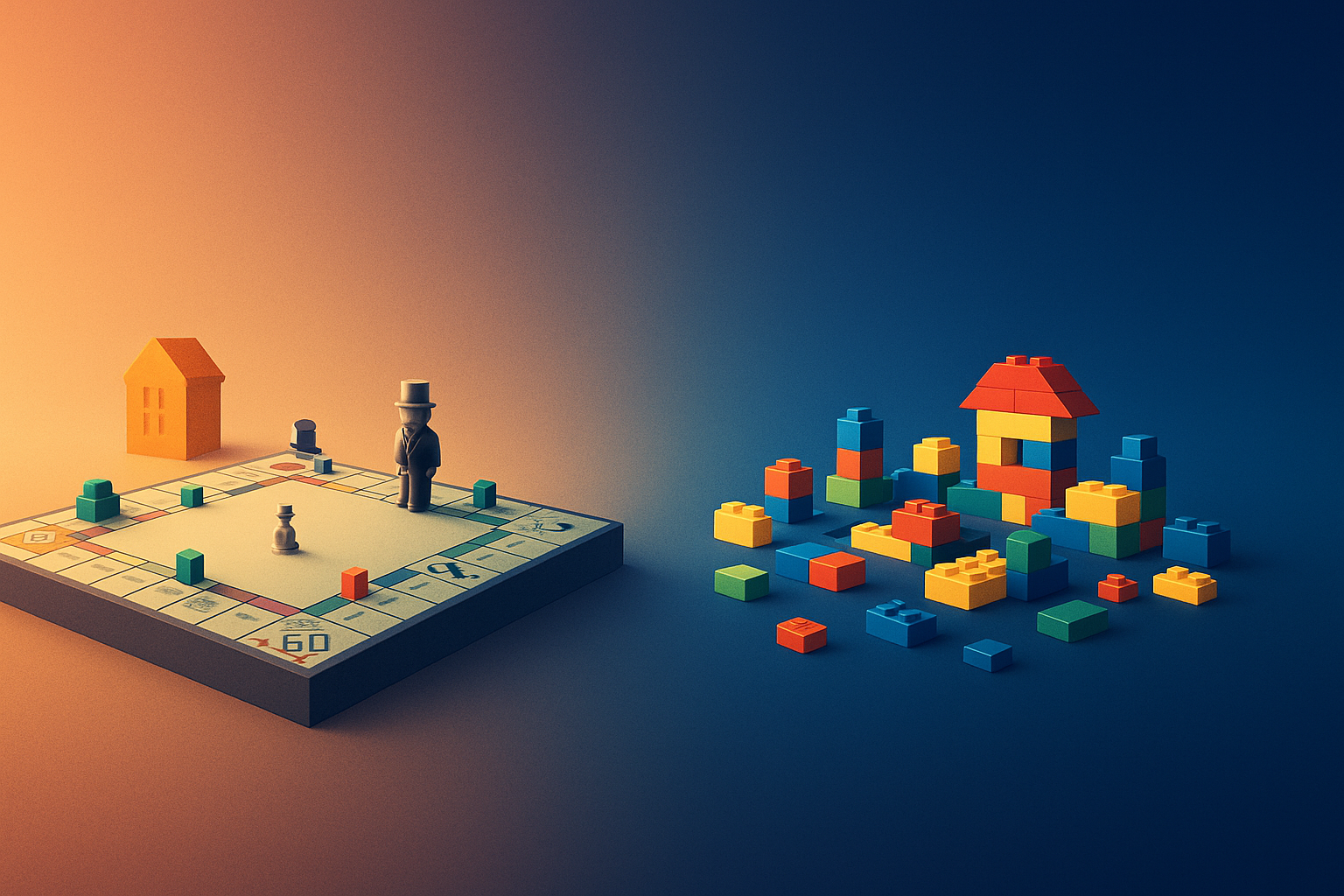Monopoly and LEGO are not merely games. They are worldviews.
One teaches us how systems capture imagination, the other how imagination births systems.
Both are reflections of the human will — one to control, the other to create.
1. The Metaphysics of Monopoly: The Illusion of Control
In Monopoly, value is predefined.
Every street, every station, every chance card is bound by the invisible hand of rules.
Players compete not to invent but to acquire.
To win, you must own — and through ownership, reduce others to renters of your will.
Here, the metaphysical essence is accumulation.
Monopoly dramatizes a universe where scarcity is sacred.
Even time and luck — the dice — are commodified.
It teaches not creativity but calculation; not collaboration but containment.
In this world, freedom is measured in liquidity.
The “bank” — that unseen overseer — stands as a silent deity of order, rewarding those who play by its laws.
Metaphysically, Monopoly asserts a cosmos where power is finite and must be captured to be experienced.
It is a game of gravity, not grace — pulling everything down toward the center of wealth,
until one player remains — a monarch of meaning, surrounded by bankrupt ghosts.
2. The Metaphysics of LEGO: The Freedom of Becoming
LEGO is the opposite metaphysic: a theology of possibility.
It offers not rules but bricks — matter waiting for mind.
In LEGO, the world is not owned, it is assembled.
Each brick is both atom and idea — capable of being wall or wing, ship or soul,
depending on who breathes intention into it.
While Monopoly begins with a finished board, LEGO begins with a blank space.
This inversion is metaphysically radical:
it moves from definition to creation, from control to becoming.
Where Monopoly says: the rules make the world,
LEGO whispers: the world remakes the rules.
In LEGO’s metaphysics, imagination is currency, and failure is form.
To build, one must also destroy.
Thus, LEGO embodies entropy and renewal — the sacred rhythm of all creative life.
Each build, each teardown, each reconstruction mirrors the cosmic act of creation —
not the owning of the world, but the ongoing making of it.
3. Structure vs Spirit: The Dual Nature of Play
Both Monopoly and LEGO mirror two archetypal energies within the human psyche:
- Monopoly is the Apollonian — structure, order, possession, logic, profit.
- LEGO is the Dionysian — chaos, creativity, improvisation, beauty.
Yet, the true metaphysical lesson lies not in choosing one,
but in the tension between them —
for creation needs boundaries, and freedom needs form.
A world made only of Monopoly collapses into tyranny.
A world made only of LEGO dissolves into dream.
But between the two — when we learn to build within limits,
to create systems that still breathe,
we approach the divine paradox of play itself:
the power to make meaning and to break it.
4. Monopoly as the Ego, LEGO as the Soul
Seen psychologically, Monopoly is the ego’s playground —
a simulation of dominance, status, and scarcity.
It feeds on hierarchy and thrives on comparison.
LEGO, by contrast, is the soul’s workshop —
a field where identity is fluid, where every piece fits somewhere,
and nothing is wasted.
The metaphysical movement between the two is the journey of the Self:
from ownership to authorship,
from playing to win to playing to understand.
5. The Moral Geometry of Play
Monopoly builds a square board — a closed system of repetition.
LEGO builds infinite worlds — open, expandable, recombinant.
The first traps time; the second releases it.
The first plays within rules; the second plays with rules.
In metaphysical terms, Monopoly represents determinism,
while LEGO expresses free will.
Yet both exist within the same ontological sandbox:
each needs players, hands, imagination —
for without consciousness, both are silent matter.
Thus, both affirm a deeper metaphysical truth:
that meaning is never in the game itself —
but in the player who gives it motion.
6. The Unified Field of Play
Ultimately, Monopoly and LEGO are not rivals but reflections.
They are two mirrors facing each other across the spectrum of creation:
one reflecting the laws that limit, the other the freedom that transcends.
When we learn to hold both —
to build like LEGO but think like Monopoly —
we achieve balance: creative strategy, disciplined freedom.
And perhaps that is the final metaphysical revelation of play:
that the divine child within us never stops building empires —
only learns, over time, that the true empire is imagination itself.
✨ Final Insights
Monopoly and LEGO are metaphors for two dimensions of existence — being and becoming, structure and spirit, law and love.
Monopoly teaches us that systems are necessary — that order provides a stage upon which life performs its meaning.
LEGO teaches us that within any system, imagination remains sovereign — it is the soul’s eternal rebellion against entropy.
To live well is to know when to build by the book and when to break the mold.
To understand that control without creativity is tyranny,
and creativity without discipline is chaos.
In every human endeavor — art, business, love, or faith —
we are called to play both games at once:
to respect the board, yet keep the box of bricks open.
The philosopher, the artist, the child, and the divine all meet here —
in the sacred playground of existence —
where rules meet wonder,
and every brick of reality asks:
“Will you build to win, or build to become?”

Leave a Reply